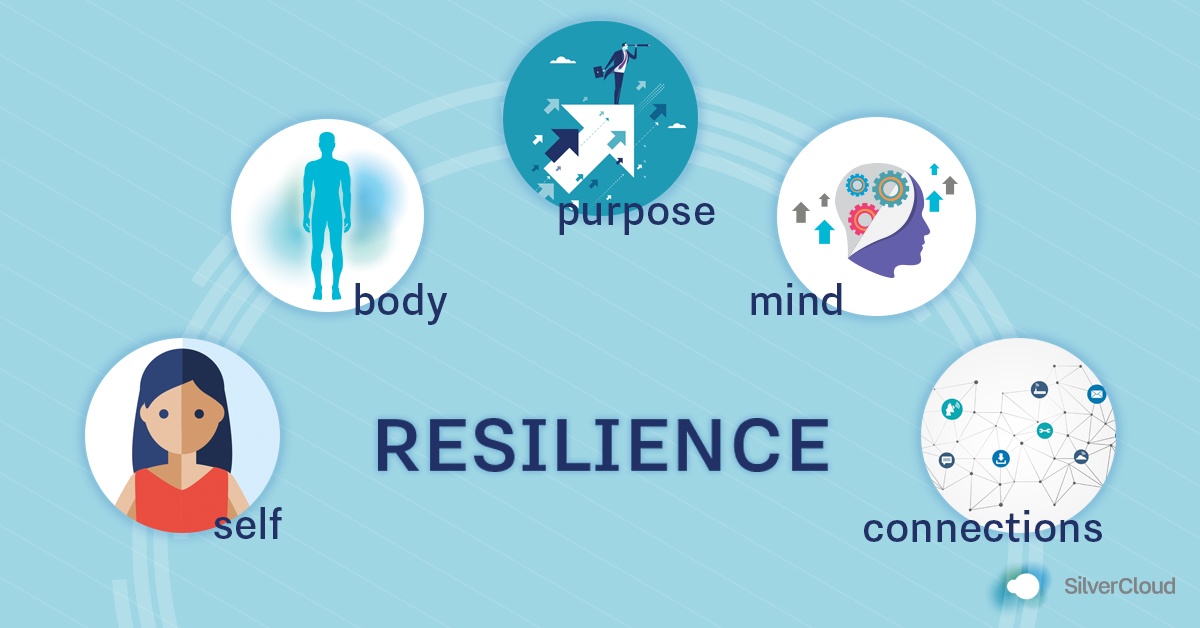
Life is wrought with problems; being resilient is not about ridding yourself of them, it is about facing them head on. Resilience is the capacity to face, overcome, and even be strengthened by difficult experiences.It involves viewing the challenges you are confronted with as valuable ways to learn and grow. But is resilience something you are born with, or can it be developed over time?
Social science research into the experience of children and adult survivors of trauma suggests that we all have a number of internal and external characteristics that can buffer us from traumatic experiences. These protective factors can be enhanced and developed through a variety of resilience strategies. In this sense resilience is not a fixed trait within a person, but rather a modifiable outcome. Resilience is something that you can learn.
The resilience strategies identified in the research can be divided into five core categories: purpose, self, connections, body and mind.
- Purpose refers to your values and what matters most to you in life. Resilient people recognize what is important to them and are aware of their passions, and they incorporate both of these into their daily lives.
- Self as a category covers self-esteem, self-worth and self-compassion. Your strengths are key here; resilient people make use of their strengths and find ways to align them with their values and passions. They also engage in positive self-talk and treat themselves with the same kindness and care that they show their loved ones.
- Connections are the bonds you experience in both your personal relationships and your wider community groups. Creating strong bonds and developing a sense of belonging are both crucial to your resilience. Resilient people are constantly finding ways to improve and nurture their connections.
- Body denotes the more physical aspects of resilience and well-being, e.g. sleep, exercise and diet. Resilient people develop healthy habits in these areas. Stress and trauma can put a burden on your body as well as your mind, so developing physical resilience is an important part of being able to cope with difficult situations.
- Mind centres around finding constructive alternatives to negative or distorted thinking. Resilient people understand that blind positivity is not always helpful, and instead they view the world through a balanced, yet optimistic, lens. They are also appreciative of the good things in their lives, practicing gratitude on a regular basis.
Additional constructs that feed into these five categories are problem solving and mindfulness. Effective problem solving involves distinguishing between what you can and can’t change, and consequently taking action or actively finding ways to cope. Being mindful means having a non-judgemental, inviting, and accepting awareness of the present moment. Essentially it involves paying attention to what you are doing, as you are doing it. Mindfulness practices have been demonstrated to be effective in increasing mental flexibility and helping people respond more adaptively to stressful situations.
Balancing all of these different elements and putting them into practice in your daily life can help you to cultivate your resilience and learn to strive in the face of challenges.
About the Author
Jacinta Jardine is an Innovation Associate at SilverCloud Health. She has a background and qualifications in both fine art and psychology, and she is currently working towards a Level 9 Certificate in Design Thinking. Jacinta also has over three years experience volunteering as an Aware Life Skills Online supporter. At SilverCloud Health she works between the Design, Content and Clinical teams, in a number of areas including clinical and innovation research, content writing and multidisciplinary development projects.








